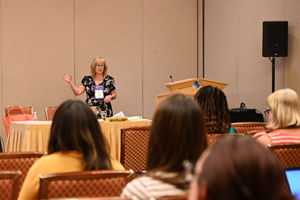
The University of Lethbridge was an early adopter of the Ellucian Banner System, highly customizing it to fit their needs since implementation in 1999. They didn’t foresee the problems that came with such specific customizations -- keeping the system frozen in time, the inability to adapt, and leaving them at least ten months behind the technological curve with each painful update.
Funding was allocated in 2014 to take the system “back to the baseline” -- to remove all the customizations, leaving the institution with a malleable system. Susie Kennedy, Registrar, was given the daunting charge of leading the project --which would require a major collaborative effort and a total metamorphosis of their institution .
"Back to baseline” became a sort of mantra for the university, though the path to achieving it wasn't clear.
Training for change
To succeed, they needed a multipronged approach--both institutional and individual--and to take the process one step at a time. Setting parameters for the project, they came up with 750 specific items to address, and drew up a budget with a process that had the support of documentation.
In addition to the expertise of consultants, Kennedy relied on the development and curiosity of her own employees. With so much change, she knew her staff needed professional development opportunities in order to help them feel invested in the project and feel that they could change with the new system -- rather than that the change was happening to them. She supplemented the team’s transition by enrolling her team in on and off campus courses on database development, change management, project management and having managers as mentors.
“Everyone is expected to have an opinion,” she told them.
Change as an opportunity professional development
In the end, all of the change within the team created new opportunities for upward mobility in roles. A physical rearrangement of the office solidified the change, rather than just making in an intangible concept.
Once the transition was complete, Kennedy had a new outlook for the office moving forward: project success, optimism, support for team members, testing and finding errors (with a strong IT partnership), and continuous learning.
“Fiat lux” is the motto of The University of Lethbridge, and that is now what they strive towards--”let there be light” from research, learning, and collaboration.